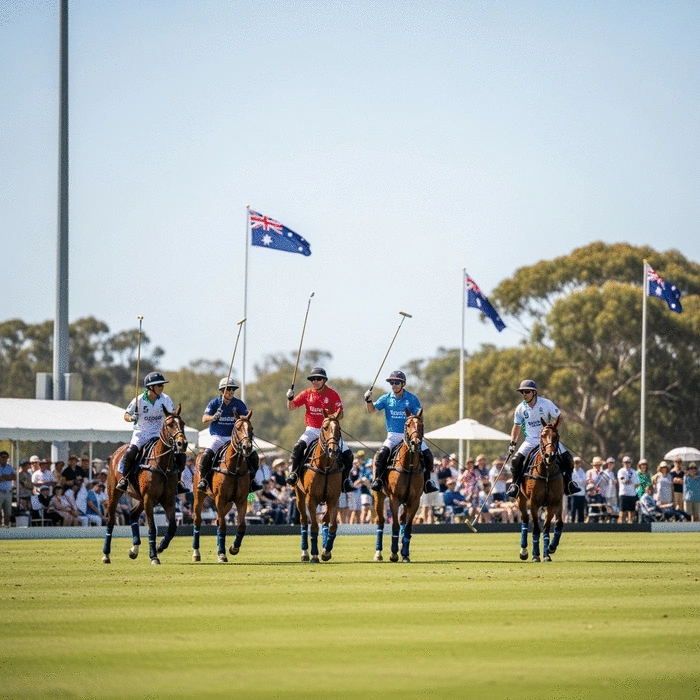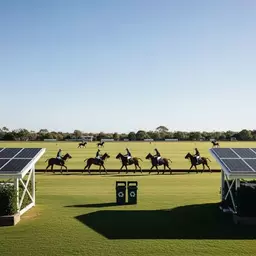Initial Planning & Objectives
- Determine purpose (fundraising, community, player showcase).
- Identify target audience & scale.
- Assess resources & challenges.
Unlock exclusive expert advice, practical tips, and comprehensive guides for Australian polo clubs. Stay informed, inspired, and connected!
Posted on: 2025-10-26
By: Morgan Fitzpatrick
Are you ready to transform your community through the thrilling sport of polo? Organizing a tournament is not just about the game; it's about uniting people and creating lasting memories. With the right planning and insights, you can craft an unforgettable event that resonates within your local community!
This visual outlines the crucial stages involved in organizing a successful polo tournament, from initial planning to post-event reflection and community engagement.
Organizing a polo tournament is an exhilarating endeavor that not only showcases the thrill of the sport but also significantly enhances community engagement. These tournaments serve as a celebration of talent and camaraderie, drawing players, families, and local supporters together in a shared love for polo. Have you ever experienced the electric atmosphere at a tournament? It's something truly special!
By hosting a tournament, clubs can cultivate a sense of belonging among members and encourage local participation in the sport. It’s a wonderful way to introduce newcomers to polo and foster connections within the community. Let’s explore how to get started!
Before diving into the nitty-gritty, it's essential to grasp the fundamental components involved in organizing a polo tournament. Start by determining the key objectives of your event. Do you want to raise funds for your club, promote community involvement, or simply provide a platform for players to showcase their skills? Each of these goals will shape your planning process. You can learn more about different approaches to hosting a polo tournament in Australia through dedicated resources.
Understanding these elements will pave the way for a successful tournament that resonates with your community. So, what are your primary goals for your polo tournament? Defining these will set a strong foundation!
Every successful tournament begins with careful planning. Take some time to outline the vital planning elements that will guide your efforts. First, think about the tournament's objectives and how they align with your club's broader mission. This clarity will help in making decisions down the line.
By considering these factors upfront, you’ll be better equipped to navigate the complexities of tournament planning. Remember, every detail counts, and being prepared can make all the difference!
When it comes to structuring your tournament, you'll want to choose a format that best suits your participants and objectives. Different formats can cater to varying skill levels, so think about how to create an inclusive environment that encourages everyone to compete.
Taking the time to define these elements early on will ensure a smooth tournament flow and a more enjoyable experience for all involved.
Adhering to the Australian Polo Federation’s standards is crucial in maintaining the integrity of the sport. As you draft your rules, make sure they align with both the federation's regulations and any local rules your club follows.
By establishing clear rules, you create a fair playing environment that enhances the competitive spirit and enjoyment of the tournament.
Logistics are the backbone of any successful event. You'll need to detail the field dimensions, setup requirements, and necessary permits from local councils. Ensuring that everything is in place will help avoid any last-minute surprises that could disrupt your tournament.
Taking care of these logistics early on will set the stage for a successful tournament day! Every detail matters, so stay organized!
Your venue choice can make or break the tournament experience. When selecting a location, consider factors such as accessibility, parking, and facilities for both players and spectators.
Picking the right venue not only enhances the tournament experience but also encourages spectators to come out and support the players. A well-thought-out location can truly elevate your event!
Creating a comprehensive budget is essential for assessing the financial viability of your tournament. A good budget helps you plan for both expected revenue streams and potential expenses. Think about how you can sustain your tournament in the long run!
Having a clear financial plan will enable you to make informed decisions and ensure the tournament runs smoothly without financial strain.
Engaging local businesses for sponsorship can enhance your event's visibility and provide financial support. Consider what types of sponsorship packages may attract businesses in your area. This also ties into building a successful club, which you can read more about in our guide on starting a successful polo club.
Strong partnerships with local businesses can create a vibrant atmosphere at your tournament and foster community spirit. Let’s get those businesses on board!
Building relationships with local businesses is essential for the success of your tournament. These partnerships can provide resources, volunteers, and even prizes for participants.
By actively engaging with your community, you can cultivate a supportive network that enhances the overall experience for everyone involved!
It seems there isn't a specific video directly related to "Step-by-Step Guide to Organizing a Polo Tournament at Your Local Club in Australia." However, a video on managing the polo schedule might be relevant. Unfortunately, I couldn't find a direct link to a video that perfectly matches your request.
If you're interested in a broader topic related to managing polo events, you might consider "Managing the Polo Schedule" by Maureen Brennan, founder of Virginia International Polo Club:
Please note, this video is not specifically about organizing a polo tournament in Australia but could be useful for general advice on managing polo schedules.
We want to hear your thoughts! What are your main motivations for organizing a polo tournament? Is it to foster community spirit, support local businesses, or perhaps to showcase talent? Share your insights with us!
Your primary objectives could include fundraising for your club, promoting community involvement, providing a platform for players to showcase their skills, or attracting new members to the sport. Clearly defining these goals will guide your entire planning process.
Consider your resources, target audience, and venue capacity. A smaller club event might involve local teams and fewer spectators, while a larger, regional tournament would require more extensive planning, resources, and outreach.
Key logistical considerations include ensuring the field meets safety and size requirements, gathering necessary equipment (goalposts, referee gear), obtaining all required permits from local authorities, and assessing accessibility, parking, and amenities for participants and spectators.
Start by defining various sponsorship levels (e.g., gold, silver, bronze) with clear benefits for each. Create a compelling pitch that highlights how their support will benefit both their business and the community. Reach out to local businesses through emails, calls, or in-person meetings, and be prepared to showcase the event's potential impact.
Create a simple survey for participants and attendees with questions about what they enjoyed, any challenges they faced, and suggestions for improvement. This feedback is invaluable for evaluating successes, identifying areas for improvement, and creating a more enhanced experience for future events.
After the excitement of a polo tournament fades, it’s time to take a step back and reflect on the entire experience. I encourage every organizer to evaluate what worked well and identify areas for improvement. This reflection not only helps in recognizing successes but also provides valuable insights for future events. Think about what aspects were most enjoyable for participants and spectators alike!
Gathering feedback is essential; consider creating a simple survey for players and attendees. You might include questions like:
Using this feedback, you can develop an actionable plan for your next tournament. The goal is to continuously enhance the experience for everyone involved!
One effective way to streamline future tournament planning is by creating a reusable checklist or guide. This not only saves time but also ensures that important details aren't overlooked. Think of all the steps you took this time around, from budgeting to venue selection, and compile these into an accessible format.
Your template might include:
By documenting your process, you’ll not only help yourself but also assist others in the polo community who may be looking to organize their own tournaments in the future. Sharing your template can foster collaboration and strengthen our polo network!
Community engagement doesn’t stop once the tournament ends. It’s vital to maintain connections with sponsors, volunteers, and local businesses. After all, they play a significant role in the success of your event! I recommend sending thank-you notes or hosting a small appreciation gathering to show your gratitude.
Consider checking in with your partners regularly. Updating them on your club's activities and future tournaments can help keep the relationship strong and ensure ongoing support. Remember, a thriving polo community is built on mutual respect and collaboration!
To keep the momentum going after your tournament, think of creative ways to encourage community involvement in polo activities year-round. Establishing regular social events, such as friendly chukkas or informal gatherings, can help maintain interest and camaraderie. For those new to the sport, understanding polo club etiquette for beginners can also encourage greater participation.
Here are a few ideas to consider:
By fostering an environment where everyone feels welcome and engaged, you’ll contribute to a vibrant polo culture that supports future tournaments!
Social media is a powerful tool for promoting polo activities and keeping the community informed. By sharing updates, photos, and event announcements, you can keep your audience engaged and excited about what's happening in your polo club. I suggest creating a dedicated social media calendar to streamline your posting and ensure regular interaction.
Here are some strategies to effectively utilize social media:
With consistent and engaging content, you’ll build a strong online presence that keeps your community connected and informed about upcoming events!
If you're eager to dive deeper into the world of tournament planning, there are plenty of resources available to help you along the way. I recommend exploring local polo associations or online forums where seasoned organizers share their insights. Books, webinars, and workshops can also provide valuable knowledge about best practices in event planning.
Some useful resources to consider include:
Investing in your learning will only enhance your ability to create successful polo tournaments in the future!
Networking is essential in any field, and polo is no exception! Connecting with other polo clubs, players, and associations can open doors to collaboration and new opportunities. Attend local events, workshops, or polo matches to meet others who share your passion for the sport. For more insights on making these connections, consider exploring choosing a polo club membership to expand your network.
Don’t hesitate to reach out to fellow organizers and share experiences. You may find mentors who can guide you through the intricacies of planning your next event. Building these relationships contributes to a more vibrant polo community in Australia!
Are you ready to take the plunge and start planning your own polo tournament? I believe in your ability to create a successful event that brings the community together! Use the insights and tips shared in this article as a roadmap for your journey. Remember, every great tournament starts with a single step. So gather your team, outline your goals, and let’s make it happen!
Here is a quick recap of the important points discussed in the article:

 What if you could enjoy the thrill of polo while also making a positive impact on the environment? S
What if you could enjoy the thrill of polo while also making a positive impact on the environment? S
 Did you know that being part of a polo club not only enhances your skills but also immerses you in a
Did you know that being part of a polo club not only enhances your skills but also immerses you in a
 Have you ever wondered how polo clubs can make a significant impact on our environment while celebra
Have you ever wondered how polo clubs can make a significant impact on our environment while celebra